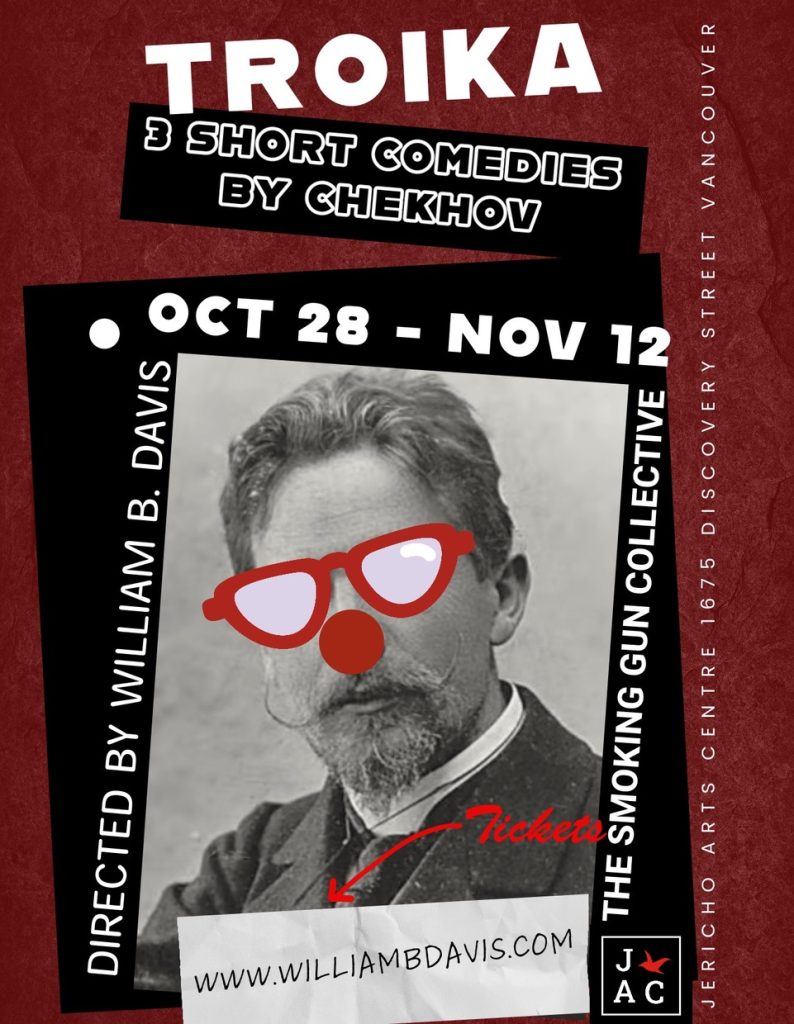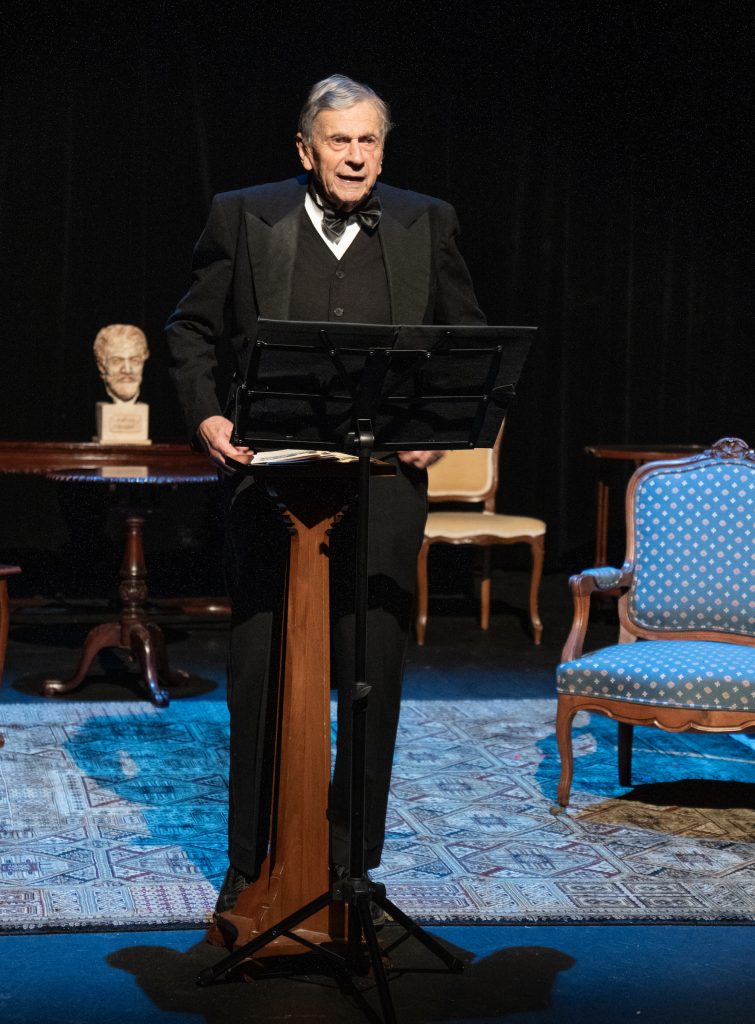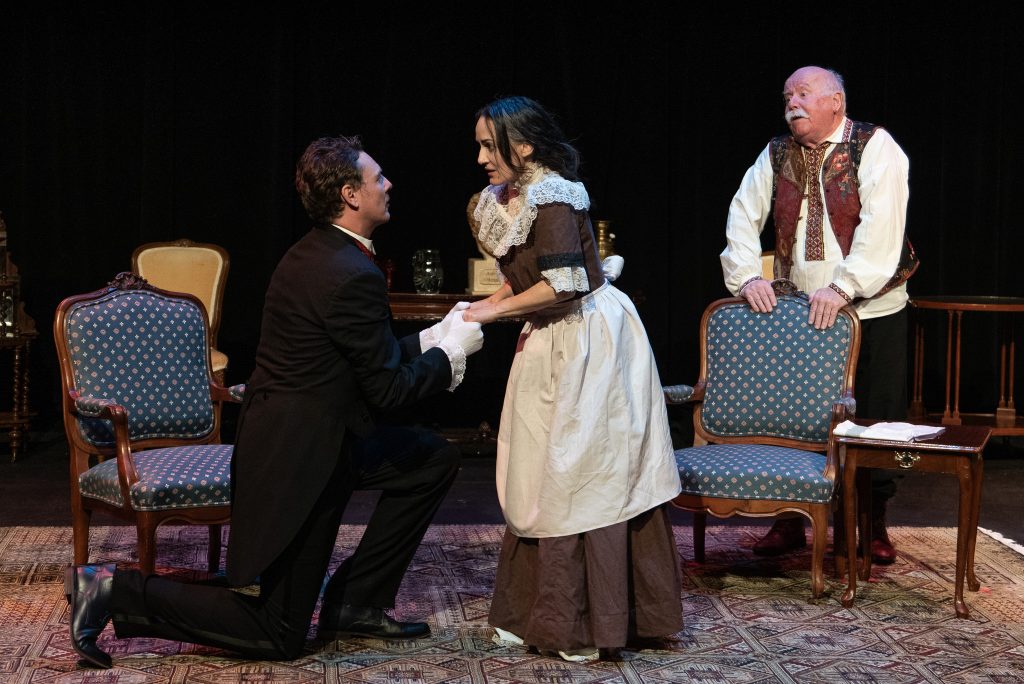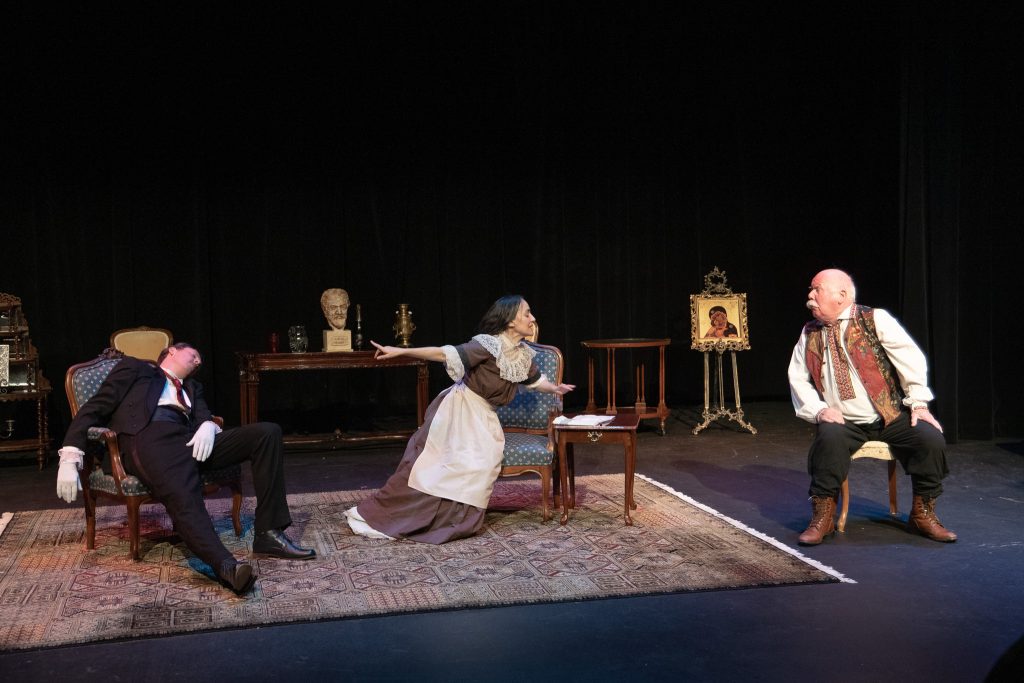 Jericho Arts Centre to November 12, 2023
Jericho Arts Centre to November 12, 2023
Tickets from $30 at https://www.williambdavis.com/troika/troikatickets
Posted November 3, 2023
Troika became dvoika at the last minute on November 1 when, out of an abundance of caution, The Bear was cancelled. Fortunately, these three one-act comedies by the great Russian dramatist Anton Chekhov had three different casts so The Proposal and On the Harmful Effects of Tobacco were able to go ahead that evening. Patrons had the option of staying for the performance or rescheduling; I stuck around. Protocols are now in place and Troika is once again three (troika) not two (dvoika) short comedies presented by The Smoking Gun Collective, directed by William B. Davis.
These one-acts were written in his late twenties and early thirties by Chekhov who put himself through medical school by writing and publishing short stories and short plays. Later, after finishing med school, he continued writing short humorous pieces for newspapers and periodicals to augment his income as a doctor. The major plays – The Seagull, Uncle Vanya, Three Sisters and The Cherry Orchard – were all written in his thirties and forties and it is on these four plays that his reputation as one of the greatest dramatists of all time rests. But it’s interesting and informative to look at these short works and to track recurring themes in the later, masterful plays.

Credit: Emmanuelle Davis
Although written early on, Chekhov continued to revise On the Harmful Effects of Tobacco right up to two years before he died. Known, apparently, as ‘Russia’s most elusive literary bachelor’, he avoided marriage in spite of many affairs including one with the wife of one of his university professors. In a letter to his friend and colleague Alexei Suvorin he writes, regarding his unmarried state, “ By all means I will be married if you wish it. But on these conditions: everything must be as it has been hitherto—that is, she must live in Moscow while I live in the country, and I will come and see her…. I promise to be an excellent husband, but give me a wife who, like the moon, won’t appear in my sky every day.”
In On the Harmful Effects of Tobacco, the single character, Ivan Ivanovich Nyukhin has been in a bad marriage for more than 30 years. His wife has ordered him to give a lecture on the harmful effects of smoking – and he is a smoker – and he is doing so, but reluctantly and very tangentially. We are his audience. He tells us she calls him “scarecrow”, “viper” and “devil”; he wants to run away “to the ends of the earth”, away from his “cheap, vile wife” and seven daughters. It certainly seems a cautionary tale with little or nothing to do with tobacco and while this may have been funny at some point, it strikes me now as just sad in spite of performer William B. Davis’s excellent performance.

Credit: Emmanuelle Davis
The Proposal could also be seen as sad but it seems so true to the folly of human nature that you have to laugh. Lomov (Chris Walters), a landowning neighbour of Chubukov (Jack Rigg) comes, in formal attire, to propose to Chubukov’s daughter Natalya (Rebecca Husain). Lomov admits to us that he is “a nervous wreck” and “If I look for an ideal wife or real love, I’ll never get married”. Lomov has, obviously, just decided at the age of “almost thirty-five’” that he must marry and Natalya ‘will do’.
But before he can even propose, the arguments begin: both claim to own the Oxen Meadows. They argue, they insult each other, she calls him a “land grabber”. Natalya’s father, who has left them alone, comes in to find them arguing and he joins in: “your grandfather was a drunk”, “your mother was a hunchback” and on it goes until Natalya suddenly discovers Lomov has come to propose and they have just sent him packing. “Bring him back. Oh, my god, get him back.” But when he comes back the arguments start up again over who has the better dog.
The highlight of this little piece is Husain as Natalya. Husain is small but mighty. And her body language is perfect: exaggerated but not too much. It’s delightful. Obviously, The Proposal is farcical and both Rigg and Walters ham it up gleefully.

Set: Linda Begg. Costumes: Julie White.
Lights: Andy Sandberg. Credit: Emmanuelle Davis
What’s especially interesting in these short one-acts is that they give us a glimpse of Chekhov’s thoughts on marriage and relationships in general: never peaceful, loving or supportive. Always fractious, complicated, burdened by miscommunication. And while Chekhov himself did eventually marry at the age of forty-one, it was apparent to everyone who knew him that he and his wife, actress Olga Knipper, got along much better when she was in Moscow and he was anywhere else.
It took the late, great plays for Chekhov successfully to merge comedy and drama – although many productions past and present – unfortunately fail to find the humour in them. Chekhov, dead for almost 120 years, is probably still shaking his head over that. Undoubtedly, he’s having the last laugh.

